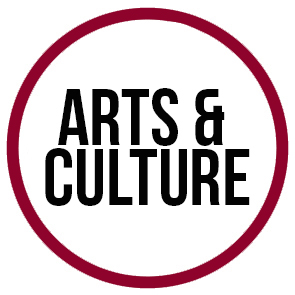Abd Al Malik Discusses Debut Film, “May Allah Bless France,” at FCLC

March 7, 2015
“An exchange between people is a question of vibration – you cannot understand the vibration intellectually, but it can touch your heart,” Abd Al Malik said, as he discussed the evocative way of understanding his debut film, “May Allah Bless France.” On Friday March 6, the internationally acclaimed French musician and writer gave students and faculty insight into the influential power of cinema at Fordham College at Lincoln Center (FCLC).
“May Allah Bless France,” debuts in the United States on March 7 and 8, follows the story of the young Regis Fayette Mikano. As the son of Congolese immigrants, Regs grows up in Neuhof, a suburb of Strasbourg in the Alsace region of France. The film looks at the intellectual and spiritual development of Regis, as he studies philosophy and literature and decides to “enter into” Sufism. Furthermore, Regis takes on the name Abd Al Malik, and converts to Islam from his original Catholic faith.
From watching the film, Malik wants audiences to witness the inside, or “suburbs,” of France today.
“There are so many films about the suburbs and the projects, and I’m a witness to it. People have a lot of fantasies and ideas about these suburbs. People also have a lot of ideas and fantasies about money and Islam,” Malik said. “My project was to see if I could make fiction take reality and speak about today. In other words, I wanted to make cinema into a suburb; this will have audiences witness the inside and look at today’s reality.”
When making this film, Malik was inspired by Kassovitz, as well as the ideas ranging from Italian neo-realism to that of Spike Lee. “My idea is to take all these ideas and all these types of films, and bring them together to talk about today’s social problems,” Malik said.
Malik’s desire to remedy today’s social problems began from his rough years as a boy living in a French suburb. “I saw my first dead person when I was 13 or 14 years old; it was one of my closest friends, who died from a heroin overdose. I came from a place where not just one or two people died; it was more like 30 people. Violence: I’ve really known it. I felt it in my flesh,” he said.
However, through these deadly experiences, Malik discovered the powerful influence of the arts. “I saw people die because they saw the movie ‘Scarface.’ They saw the movie and Tony Montana; because of that, they fell into drugs. I saw the deadly effect of art,” he said. “But then I told myself – if art can be deadly, then it can also be life. To be a humanist artist is a way to be life to the world.”
According to Malik, there are still many problems in the suburbs, as well as the political nature of France. “I think we are living in a very dangerous era in France,” he said. “In France, we have politicians and media who put people like me, people who are French but parents came from elsewhere, into the suburbs. They are literally placing us in places that are ‘sub,’ or in French, ‘du’ means the outside of society.”
“In France, we have these people making beautiful speeches, but in truth, we have first and second zone citizens,” Malik continued. “By treating the people this way, the politicians are already preparing for the civil war; it is already here.”
Malik stated that it is the artist’s responsibility to educate the people about the political state of France. “Artists like me have to take the tools that we have to talk about [the civil war]. We have to make it seen, or else the politicians will put us in this bad situation,” he said.
According to Malik, cinema has the ability to bring people together through these turbulent times. “For me, cinema was the best means for what I wanted to convey – I want to write social novels but put them into picture and make films. Cinema was the best way to do it,” he said. “Cinema offers us this opportunity of coming together and reflecting about these things. The challenge of our era in this time of globalization; the challenge is to live together. ”









